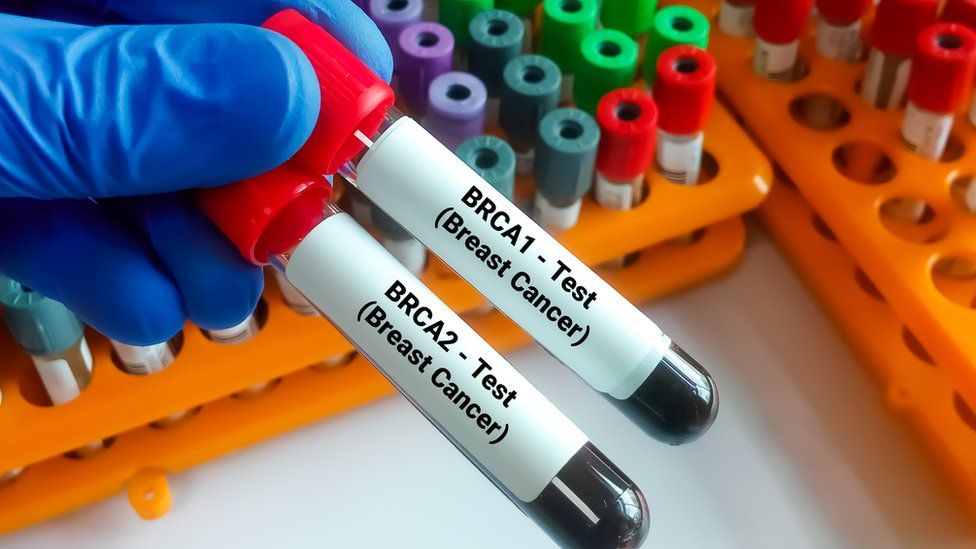BRCA tests to be offered to Jewish people to detect cancer risk
- Published

Tens of thousands of people with Jewish ancestry will be offered genetic tests to find out if they have an increased risk of developing some cancers.
People with Jewish ancestry are far more likely to have inherited faulty BRCA genes than the general population.
Those born with impaired BRCA1 and BRCA2 genes have a greater risk of developing breast, ovarian, prostate or pancreatic cancer.
The NHS England screening programme is part of a drive to detect cancer early.
Women who have faulty BRCA genes have been found to have up to a 72% chance of developing breast cancer and 44% chance of developing ovarian cancer, compared with 11.5% and 1.5% respectively for the general population.
People who are found to have defective BRCA genes, known as being BRCA positive, will be given early access to cancer detection services such as mammograms or MRI scans. They may also be offered preventative surgery or medication, and advised to make risk-reducing lifestyle changes.
Home testing
Anyone aged over 18 who has at least one Jewish grandparent is eligible for screening, under the NHS Jewish BRCA Testing Programme . Previously, people had to meet more stringent criteria to be tested, meaning fewer had qualified for the programme.
The tests can be ordered online and completed at home, by taking a sample of saliva and sending it off to a laboratory.
Everyone carries BRCA genes, which repair DNA damage and usually help to protect against cancer.
However, it is estimated that a fault in one of those genes affects about one in every 400 people, with Jewish people six times more likely to be affected.
There is a 50% chance of someone who has a faulty BRCA gene passing it on to any children.
However, having an altered BRCA gene does not mean a person will definitely develop cancer.
Peter Johnson, national clinical director for cancer at NHS England, said the testing programme had "the potential to save lives".
"We know it can be daunting finding out whether or not you have an altered BRCA gene, and some people may feel they'd rather not know - but finding out early means people can get the support they need from the NHS," Mr Johnson said.
'Not worth the risk'
Katie Kaye, a Jewish mother-of-two who is BRCA positive, said she was "thrilled" about the rollout, highlighting how screening had previously been difficult for some to access.
Ms Kaye, from Borehamwood, Hertfordshire, said she was tested after her mother died of breast cancer aged 35.
"I decided it was the best option. That way I could decide what I wanted to do," she said
"I have young kids, and the thought of not being around for them is not an option."
Ms Kaye plans to have a preventative double mastectomy this summer, followed by surgery to remove her ovaries next year.
"It will be nice not to have it hanging over me," she said.
She said she could understand why people might avoid being tested, but added, "it's silly to bury your head in the sand - it's not worth the risk".
During a pilot phase of the programme, 5,000 people of with Jewish ancestry came forward for testing, 80 of whom were found to have defective BRCA genes.
The aim of the national rollout is to test 30,000 people over the next two years.
Nicole Gordon, chief executive officer of the charity Jnetics - which has worked with the NHS on the rollout - described the programme as "a huge opportunity to gain the knowledge that will help mitigate against the impact of hereditary cancer, and ultimately save lives".
"We want to ensure that this programme reaches as many people as possible," said Lisa Steele, chief executive of Chai Cancer Care, who also worked alongside the NHS on the testing programme.
Cancer Research UK estimates 5-10% of all diagnosed cancers are linked to an inherited faulty gene, but that figure is not specific to BRCA genes.
NHS England said it "continues to roll out innovations to catch cancers early - when treatments are more likely to be successful".
Related Topics
- Published16 March 2023
- Published15 February 2018
- Published12 January 2018
- Published1 December 2014